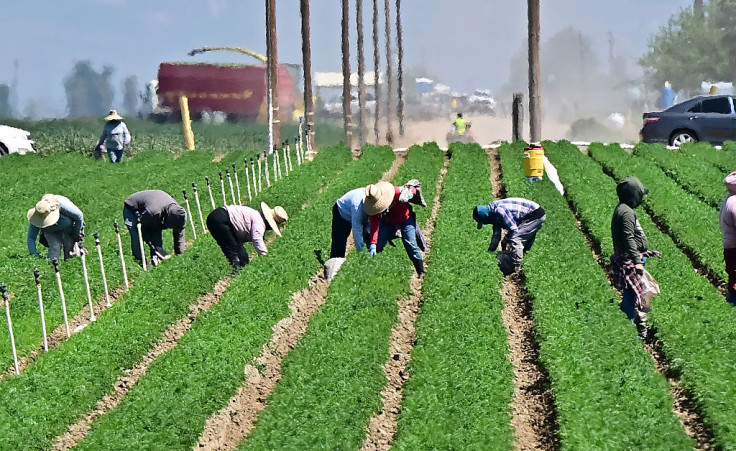 Farm workers labor in the fields of Bakersfield, Kern County
Photo by FREDERIC J. BROWN/AFP via Getty Images
Farm workers labor in the fields of Bakersfield, Kern County
Photo by FREDERIC J. BROWN/AFP via Getty Images
The Trump administration has moved to ease hiring rules for foreign farmworkers while immigration authorities appear to be reducing workplace raids in the agricultural sector, according to a Stateline report. The shift comes as the White House faces political pressure over rising food costs and has recently lifted tariffs on a range of imported foods.
To address labor shortages, the administration last month implemented changes to the H-2A agricultural visa program, allowing the Department of Homeland Security to approve visas more quickly.
The U.S. Department of Agriculture said in a statement to Stateline that the administration is "prioritizing fixing programs farmers and ranchers rely on," even though Agriculture Secretary Brooke Rollins said in July that the administration's goal of a "100% American workforce" still stood.
Related-
Tens Of Migrants Rescued From Stash House Near The Border After One Manages To Sneak Out And Call For Help

-
Trump Admin Sues to Block California Mask Ban Citing 'Unprecedented Harassment, Doxing, and Violence' of Federal Agents

-
Former Border Patrol Agent Sentenced To More Than Six Years In Prison For Taking Bribes From Cartel

The H-2A program has issued roughly 420,000 visas annually since 2023, covering about half of all agricultural jobs. Under the expanded program, the government expects to issue an additional 119,000 visas. The new rule also lowers mandatory minimum wages for H-2A workers in many states and allows employers to charge for housing that was previously free.
In North Carolina, for example, the hourly rate for unskilled workers dropped from $16.16 to $11.09.
Grower groups welcomed the changes. "If you think farmers are making more money in these conditions, you're wrong. They're going broke," said Lee Wicker of the North Carolina Growers Association. He said workers would likely return despite lower wages. Jeffrey Dorfman, an economics professor at North Carolina State University, said the policy "will save farmers tens of millions of dollars statewide."
Labor unions criticized the changes. Antonio De Loera-Brust of the United Farm Workers said, "First came the raids, which hurt workers, and now in order to appease business interests, they make all these concessions on wages and the guest workers program."
At the same time, experts and growers say ICE has scaled back raids on farms in recent months. After conducting several agricultural workplace operations earlier in the year, the agency has since focused enforcement on other sectors. "We really haven't seen agriculture targeted with worksite enforcement efforts," said Julia Gelatt of the Migration Policy Institute, adding that past administrations have quietly deprioritized farm raids without formal announcements.
Wicker said farms in North Carolina have not been targeted, even as ICE increases activity in urban areas. De Loera-Brust noted that while raids in fields have slowed, "they could resume at any time," leaving workers in uncertainty.
The easing of labor rules accompanies broader trade actions affecting the food industry. FreshPlaza reported earlier in the week that importers expressed mixed reactions to newly lifted tariffs on produce such as bananas, coffee and beef. Some warned that retailers may not lower prices despite reduced import costs, while others said the changes offer needed stability to a supply chain pressured by tight global production.
Daniella Velazquez De Leon of Organics Unlimited said removing tariffs adds "some much-needed stability and predictability," though she cautioned that tight supplies, weather conditions and plant disease threats will continue to shape prices.
© 2025 Latin Times. All rights reserved. Do not reproduce without permission.
Tags: Trump administration, Agriculture, ICE raids


